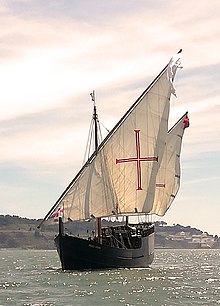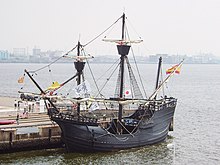
Back عصر الاستكشاف Arabic Era de los descubrimientos AST Coğrafi kəşflər AZ جوغرافی کشفلر AZB Вялікія геаграфічныя адкрыцці BE Велики географски открития Bulgarian আবিষ্কারের যুগ Bengali/Bangla Velika geografska otkrića BS Era de l'exploració Catalan Сийлахь-Даккхий географин белламаш CE


The Age of Discovery also known as the Age of Exploration, part of the early modern period and largely overlapping with the Age of Sail, was a period from approximately the 15th century to the 17th century, during which seafarers from a number of European countries explored, colonized, and conquered regions across the globe. The Age of Discovery was a transformative period in world history when previously isolated parts of the world became connected to form the world system and laid the groundwork for globalization. The extensive overseas exploration, particularly the European colonization of the Americas, with the Spanish and Portuguese, and later the British, at the forefront, spurred global trade. The interconnected global economy of the 21st century has its roots in the expansion of trade networks during this era.
The exploration also created colonial empires and marked an increased adoption of colonialism as a government policy in several European states. As such, it is sometimes synonymous with the first wave of European colonization. The colonization reshaped power dynamics causing geopolitical shifts in Europe and creating new centers of power beyond Europe. Having set human history on the global common course, the legacy of the Age still shapes the world today.
European exploration outside the Mediterranean started with the maritime expeditions of Portugal to the Canary Islands in 1336,[1] and later with the Portuguese discoveries of the Atlantic archipelagos of Madeira and Azores, the coast of West Africa in 1434, and the establishment of the sea route to India in 1498 by Vasco da Gama, which initiated the Portuguese maritime and trade presence in Kerala and the Indian Ocean.[2][3]
During the Age of Discovery, Spain sponsored and financed the transatlantic voyages of the Italian navigator Christopher Columbus, which from 1492 to 1504 marked the start of colonization in the Americas, and the expedition of the Portuguese explorer Ferdinand Magellan to open a route from the Atlantic ocean to the Pacific, which later achieved the first circumnavigation of the globe between 1519 and 1522. These Spanish expeditions significantly impacted the European perceptions of the world. These discoveries led to numerous naval expeditions across the Atlantic, Indian, and Pacific Oceans, and land expeditions in the Americas, Asia, Africa, and Australia that continued into the late 19th century, followed by the exploration of the polar regions in the 20th century.
European exploration initiated the Columbian exchange between the Old World (Europe, Asia, and Africa) and the New World (the Americas and Australia). This exchange involved the transfer of plants, animals, human populations (including slaves), communicable diseases, and culture across the Eastern and Western Hemispheres. The Age of Discovery and European exploration involved mapping of the world, shaping a new worldview and facilitating contact with distant civilizations. The continents drawn by European mapmakers of the Age developed from abstract "blobs" into the recognizable to us outlines.[4] Simultaneously, the spread of new diseases, especially affecting American Indians, led to rapid population declines. The era saw widespread enslavement, exploitation and military conquest of native populations concurrent with the growing economic influence and spread of European culture, science and technology leading to a faster-than-exponential population growth world-wide.
- ^ Butel, Paul (2002-03-11). The Atlantic. Taylor & Francis. ISBN 978-0-203-01044-0. Archived from the original on 2021-04-21. Retrieved 2021-11-15.
- ^ "Portuguese, The – Banglapedia". en.banglapedia.org. Archived from the original on 1 April 2017.
- ^ Raychaudhuri, Tapan (1982). The Cambridge Economic History of India: Volume 1, C.1200-c.1750. CUP Archive. ISBN 978-0-521-22692-9. Archived from the original on 2014-07-04. Retrieved 2022-05-19.
- ^ Arnold, David (2006). The Age of Discovery, 1400-1600, (London: Routledge), p XI, https://www.google.co.il/books/edition/The_Age_of_Discovery_1400_1600/SbIEAQAAQBAJ?hl=iw&gbpv=1&dq=The+Age+of+Discovery,+1400-1600&printsec=frontcover